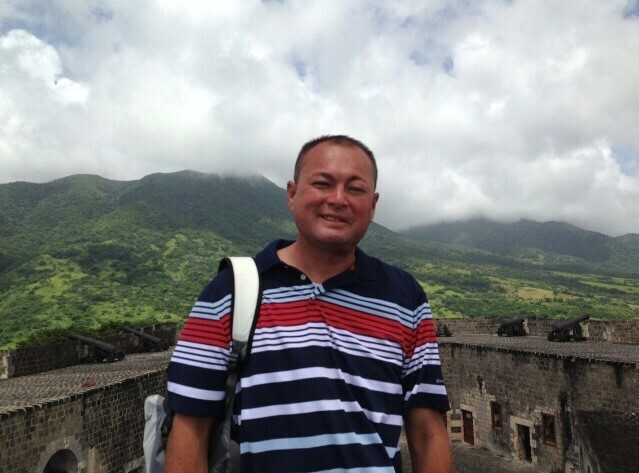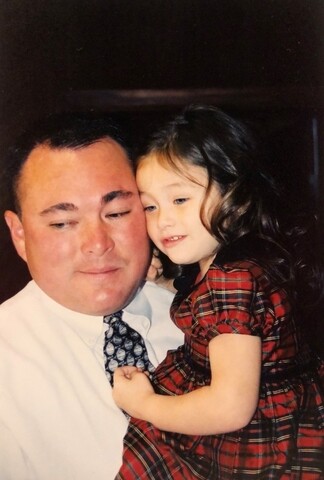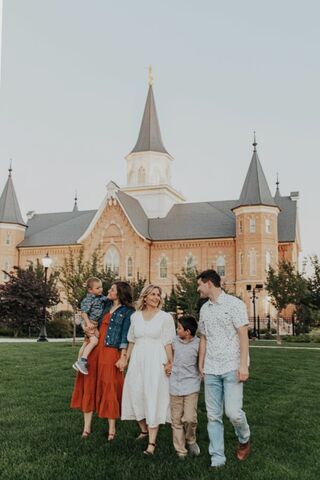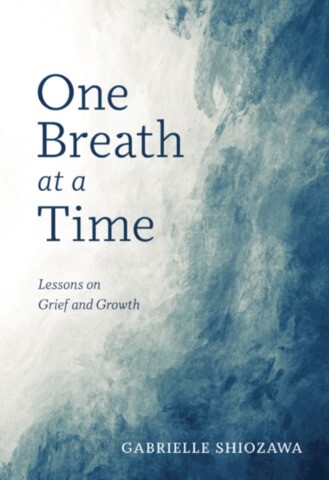I didn’t anticipate being thrust into the throes of grief as soon as I was. Yet it was in that harrowing space that I grew in profound ways. The spiritual experiences I had while struggling through my sorrow taught me lessons I would never exchange, despite the pain it took to get there.
Three weeks before I was set to graduate from high school, my dad collapsed on our living room floor and never got back up. I was 18 years old. My older brother was 20 and serving a mission for the Church in Oregon. My younger brothers were 8 and 2; my mom became a widow when she still had a child in diapers. Our family was irrevocably changed that night in ways we couldn’t begin to comprehend and still aren’t entirely sure how to handle a little more than two years later.

The First Phase of Grief
Grief hardened me. I was angry and hurt. Other graduating seniors were having the time of their lives, living up the last few weeks of their high school careers, while I was lying on the floor and just trying to survive one breath at a time. People were crying over how they were going to miss each other when they graduated while I was burying my father. As hard as I tried to keep myself from becoming bitter, anger and grief welled up inside of me at the injustice and inexplicability of losing my dad.
But grief softened me too. As I longed to see the goodness of God in such a dark and ugly situation, I came to a new realization about faith. Before my dad died, I thought faith meant that if we prayed hard enough and loved God enough and asked with just the right words, He would make our dreams become a reality. I thought if I prayed as hard as I could, then everything would be all right. So I did. The night my dad lay on our living room floor surrounded by paramedics, I got on my knees in the kitchen and gave God my whole soul in prayer. I told God we needed my dad and begged Him to please, please, let us keep him. There was not a single doubt in my mind that God would grant that plea.
But He didn’t. At least, not the way I expected. I was heartbroken. I had no idea what to do with a God who didn’t let my dad live.
I spent hours upon hours on my knees over the next 18 months just trying to comprehend how a God who loved me could refuse my pleas. I didn’t understand how He could answer my prayers with a no instead of a yes. There were so many people who prayed for my dad that night, but I could only assume that none of them had prayed hard enough. I thought it must have been our fault that God couldn’t let him live.
Eventually, I had to say, “God, I love you, but I don’t understand. I thought I knew what faith was, but I don’t think I do anymore. Please help me trust you. Please lead me along.”
God’s Perfect Love
My grief carved a space in my soul for me to understand something I had never comprehended before: Faith is about trusting God and putting our lives in His loving hands, even if we don’t understand why He does what He does. Faith is trusting that His plan is better than ours, that He sees the full staircase when we can’t even see the next step.
“Trusting in God’s will is central to our mortality,” Elder Ronald A. Rasband teaches. “With faith in Him, we draw upon the power of Christ’s Atonement at those times when questions abound and answers are few.”1 In order to have eternal joy, we have to hang on for a bumpy ride. We have to trust that God knows what we need to experience to grow to be more like Him.

There was a time as a child when I stood outside my parents’ bathroom and heard my dad’s razor whirring as he shaved his face. Always the teacher, always trying to get me to learn something new, Dad beckoned me in and brought the razor closer to me. I backed up, frightened by the noise it was making. “Gabrielle,” he said softly, “Would I ever do anything to hurt you?” I shook my head. His intent was only to show me this wasn’t something to be feared. My dad had pushed me outside my comfort zone my whole life, from making me try out for sports teams to putting me in charge of important phone calls. No matter how scary something might seem at first, I could trust that all my dad wanted to do was teach me. All he wanted to do was help me grow.
In the same way that my dad would never do anything to hurt me, and on an even more magnificent scale, our Heavenly Father would never hurt us. Even when we’re afraid of pain or grief and don’t understand what’s happening to us, even when it doesn’t make sense what we have to learn to endure in this life, God is still good. “He loves us because He is filled with an infinite measure of holy, pure, and indescribable love,” Elder Dieter F. Uchtdorf teaches. “We are important to God not because of our résumé but because we are His children.”2 Heavenly Father would never act without our best interest in mind.
Doubts as an Opportunity
I used to think it was wrong to ask questions, that it meant I lacked faith if I questioned God’s methods and intentions. But through asking seemingly endless hard questions of my Heavenly Father over the past couple of years—trying to make sense of my loss—I have discovered that having doubts is an opportunity to reaffirm what I know to be true. Asking difficult questions and being open to a real response has either confirmed my faith or taught me new principles. I prayed for God to help me understand what faith meant. I prayed about what the afterlife was like and if my dad could have salvation. I prayed to know how I was supposed to deal with a grief I’d never experienced before. Because I asked, I now better understand how forgiving God is, that Christ’s Atonement works on both sides of the veil, and that we can still feel peace while we are in pain.

I am still searching for satisfactory answers to some of my soul-stretching questions. But I’ve found that exploring the difficult concepts raised by my grief has helped me connect with bishops, friends, leaders, and teachers as we came to a greater understanding together of the divinity of God and the reality of His perfect plan. There is still so much I do not know or understand, but what I do know without a doubt is that our God loves us with a perfect love.
A True Zion Community
I once thought I was too tough and independent to need to ask anyone for help. It was not until grief broke my hard outer shell that I began to realize how important it was to let love into my life in every form. When people offered to serve me after my dad died, I let them, even though I never would have before. I called friends to come hold me and help me through my last weeks of school. When my neighbor asked if she could do anything for me, I asked her to bring me some oranges, because that was the only thing I could stand to eat for the longest time after losing my dad. Recognizing when we need help and reaching out to others is a strength, not a weakness. It is an opportunity for empathy, not embarrassment; connection, not competition. We do not have to walk alone when there are loving humans all around us, waiting to buoy us up. As we struggle together, we experience a fragment of what it is like to suffer the way Christ did. We feel a sliver of His anguish and of His love as we learn how to carry each other’s pain.
The experience of being human is collective. We all have different experiences, aspirations, and struggles, yet it is when we work together, lean on one another, and lift each other up that we build a true Zion community. “We may never know the healing balm that our efforts may be to those around us who are lonely, depressed, sick, weak, or suffering,” Merrilee Browne Boyack writes. “Even simple gestures of love can have a powerful influence.”3 Sometimes it takes being broken through trials and grief to learn how to be soft enough to let people love you the way Christ does.
The Unexpected Gift
Grief gave me a fuller picture of the plan of salvation than I have ever had before. It helped me understand how hard it must have been for God to send each of us, His children, to earth where we often feel so far away from Him. My heart was so broken and humbled that I had to learn to ask for help, focus on what truly mattered most, and lean on Christ in everything I did. I called upon angels. I received priesthood blessings. I read scriptures and sang hymns with a fervor and a hunger I never had before because I knew they would fill me when nothing else could.

My new capacity to feel deep pain and anguish carved out a deeper reservoir for joy in my soul. Recognizing the potential joy that existed in even the littlest things gave me a reason to keep living: roses blooming in the backyard, holding my baby brother as he fell asleep in my lap, and the sound of my best friend’s laugh. I learned how to live with the same exuberance I would feel if my dad were still here going on these adventures by my side. I know now that Dad has been here with us all along because I have heard his voice and have felt his light. My dad knows me better now than he ever has before; he’s watching his family grow up, and he’s growing with us. “Angels are still sent to help us . . . both the heavenly and the mortal kind,” Elder Jeffrey R. Holland says.4 The veil between heaven and earth is thinner than we may think—our loved ones are not as far away from us as they sometimes seem to be.
I never asked for grief. Yet it has been my greatest teacher. In fact, the grief I have experienced has been an unexpected gift, bringing me closer to my God.
You can read more from Gabrielle Shiozawa in her first book, One Breath at a Time: Lessons on Grief and Growth, which gives an authentic and inspiring look into how people can heal, grow, and come closer to Christ through grief and loss. Available at Deseret Book anddeseretbook.com.
Notes
1. Ronald A. Rasband, “Special Lessons,” Liahona, May 2012, 80.
2. Dieter F. Uchtdorf, “The Love of God,” Ensign, Nov. 2009, 22.
3. Merrilee Browne Boyack, “Helping Others Receive the Lord’s Healing,” Ensign, June 2009, 23.
4. Jeffrey R. Holland, “The Ministry of Angels,” Ensign, Nov. 2009, 29, 31, emphasis in original.

